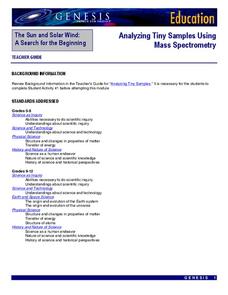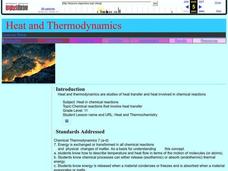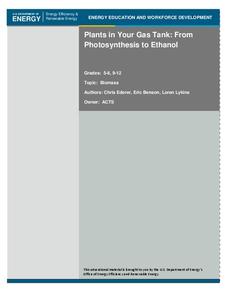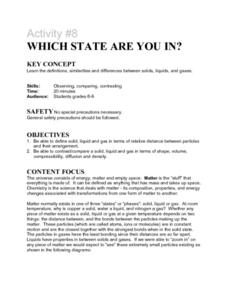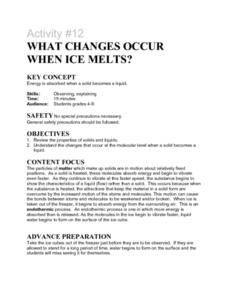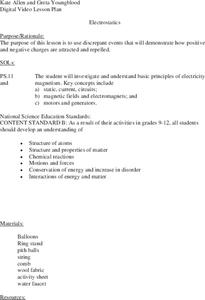NASA
Supernova Chemistry
By measuring the wavelength, frequency, and intensity of electromagnetic radiation, scientists determine the temperature, density, and composition of far away items. Scholars rotate through ten lab stations using a spectroscope at each...
Cornell University
Light Waves: Grades 6-8
Explore the behavior of light with different materials. Collaborative groups determine whether certain materials absorb, reflect, diffract, or transmit light waves. They then measure the angle of incidence and angle of reflection.
Cornell University
Radical Reactions
The radical reactions of polymers seems abstract to many pupils, but this activity turns them into a fun building game. Scholars use dice and building pieces to build polymers. Then, they determine the theoretical and experimental weight...
Curated OER
Amounts of Dissolved Oxygen in Various Bodies of Water
Students test water to determine the dissolved oxygen content while displaying the proper use of testing instruments while visiting water testing sites. They determine if the amount of dissolved oxygen is appropriate for the tested...
NASA
Analyzing Tiny Samples Using a Search for the Beginning Mass Spectrometry
Teach the basics of mass spectrometry with a hands-on lesson. The fourth in a series of six lessons explores how mass spectrometry measures the ionic composition of an element. Learners then compare and contrast relative abundance and...
Curated OER
Dilution and Concentration of Solutions
Future chemists practice laboratory techniques by creating a monochloramine solution. The objectives are to use of dilution, 9concentration, and measurement skills and to prepare a solution that will be used in a water treatment...
Curated OER
Heat and Thermodynamics
This is actually a 10-day mini unit on thermal energy for your high school chemists. Every avenue is taken to get learners absorbed in heat: a pretest, a PowerPoint presentation, Internet exploration, demonstrations, lab activities, and...
Virginia Department of Education
Formulas and Percent Compositions of Ionic Compounds
Try not to blind anyone with science by following the safety rules. The lesson encourages scholars to form an ionic compound from magnesium and chlorine. Then they determine the empirical formula and determine the mole ratio and percent...
Messenger Education
Cooling with Sunshades
Messenger's sun shade measures 8 ft x 6 ft and will have temperatures reaching 700 degree Fahrenheit on the outside while maintaining a cool 70 degrees underneath. In the third activity of four, groups discuss the basic properties of...
NASA
Development of a Model: Analyzing Elemental Abundance
How do scientists identify which elements originate from meteorites? Scholars learn about a sample of material found in a remote location, analyzing the sample to determine if it might be from Earth or not. They study elements, isotopes,...
Curated OER
Plants in Your Gas Tank: From Photosynthesis to Ethanol
Explore ethanol and how it is produced. Young scientists investigate photosynthesis and fermentation to the concept of conservation of energy and mass. They discuss the environmental and economical benefits of ethanol as a fuel additive.
Alabama Learning Exchange
Float or Sink?
Experiment with mass and density as scholars figure out what makes things float or sink. First, they watch a podcast introducing these concepts. Be sure to use the comprehension question to test their understanding. Young scientists...
Curated OER
Activity #8 Which State Are You In?
Young scholars define, give similarites and differences between solids, liquids, and gases. They compare and contrast a solid, liquid and gas in terms of shape, volume, compressibility, diffusion and density. Pupils classigy common...
Curated OER
What Changes Occur When Ice Melts?
Young scholars explore the physical process of melting. They observe melting ice and answer questions related to energy transfer during phase changes.
Curated OER
Solution Chemistry Investigation
Students engage in a instructional activity that is concerned with the concepts related to solution chemistry. They calculate the molar mass of various chemical compounds. Then students predict the anion ratio for ionic compounds....
Curated OER
Nanofibers on Your Clothes
Learners relate the presence of nanofibers in clothing to its ability to repel stains. They observe and contrast the characteristics of nanofiber, Scotchguard treated, and regular fabric then test the stain resistance of each fabric...
Curated OER
Conductors and Insulators
Fifth graders explore conductors and insulators. In this science lesson, 5th graders act as electrons moving through a wire. Students break into groups representing conductors and insulators and explore how they work with electrons.
Curated OER
Things That Glow
Third graders study the concept of light as an energy source. In this energy lesson students participate in a lab that show them the concept of light as an energy source.
Curated OER
Electrostatics
Middle schoolers examine ways positive and negative charges are attracted and repelled by watching teacher demonstrations, and complete activity sheet related to classroom demonstration activities to prove proficiency of knowledge of...
Curated OER
Properties of Metals
Fifth graders study the properties of metals and use them to identify different properties. In this metal properties instructional activity students complete a demonstration .
Curated OER
Oxidation and Salt
Students study the reaction on iron in water, air, and sodium chloride. They create a situation that shows this process and gives them the opportunity to hypothesize what, why, and how. They keep records and do an oral and written ...
Curated OER
Making Molecules
In this making molecules worksheet, students complete a table of elements with their symbol, atomic number, atomic mass, number of protons, number of electrons, period and group. Students then make models using pipe cleaners and beads of...
Curated OER
Conservation of Mass
In this conservation of mass worksheet, students design an investigation to demonstrate the Law of Conservation of Mass. Students describe their investigation, collect data, graph the data and write a conclusion about what they discovered.
Curated OER
Introduction to the Periodic Table of Elements
Students explain how the elements are arranged in the periodic table. In this chemistry lesson, students determine the subatomic particles for certain elements. They research the physical and chemical properties of an element they chose.
Other popular searches
- Atoms and Matter
- Atoms Basic Unit of Matter
- Atoms Basic Unit of Matter
- Matter Atoms Molecules
- Atoms Matter Experiments




